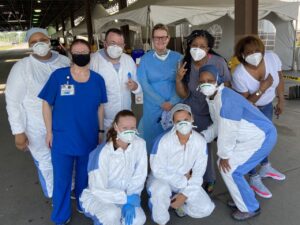Jamie VanDaele, Future for Frontliners recipient, became eligible for the scholarship through her work as a certified nursing assistant in hospice during the pandemic.

As a teacher, mother and fiancé, she is also working toward an associate degree in early childhood education at MCCC.
“It’s hard. I am a mom of two working full time,” said VanDaele. “I can only take two classes a semester. After working all day, I have to come home and be a mom while trying to learn the material for classes.”
Twenty-four percent of the MCCC student body are Michigan Reconnect and Futures for Frontliners recipients, said Scott Behrens, Vice President of Enrollment Management and Student Success.
Since the introduction of the scholarships, Behrens said MCCC has become more ethnically diverse, the amount of part time students has gone up, and the average student age has gone from 22 to 24.2 years old.
“And interestingly, one of the populations that has gone up the fastest is 40 and over,” Behrens said.
The Futures for Frontliners scholarship was made to offer free schooling to those who worked essential jobs from April 1, 2020, through June 30, 2020, and do not already have a college degree.
Futures for Frontliners scholarship became eligible for enrollment on Sept. 10, 2020 and was made available for use the spring semester of 2021.
In Feb. 2021, the Michigan Reconnect Scholarship was started for all Michigan residents over the age of 25 who did not already have a college degree.
Both Futures for Frontliners and Michigan Reconnect allow students to attend their local community college and earn their associate degree or a skill certificate
There are more people choosing to attend college later in life at MCCC than there was before these programs, Behrens said.
With more people choosing to further their education at a less traditional time in life, new difficulties are arising for that demographic of students.
“The challenges of students who are older are simply different than obviously the challenges of students who are coming in, at, you know, 18 or 19 years old,” Behrens said.
Some of these difficulties include childcare, getting used to new technology in school, mental health, familial responsibilities, work and financial needs.
“Professors need to understand that the majority of students are not young kids right out of high school,” said VanDaele. “Flexibility and understanding can go a long way for student success.”
Returning student through Future for Frontliners Mary Valentine said maintaining balance has been the hardest part.

Valentine is working as a full-time phlebotomist, maintaining family time, and taking a full-time class load at MCCC.
“I am busy from the time I wake up until the time I go to bed.” Valentine said. “I do not remember school being this tough.”
Behrens said MCCC is trying to offer support to the student body by offering free mental health services on campus this month through the Community Mental Health Organization.
For Michigan Reconnect recipient Emily Johnson, the most difficult part about returning was deciding what she would like to major in.
As a returning student, Johnson had 17 years between originally attending college and her current pursuit of an education in criminal justice.
“Mrs. Bacarella is the reason I chose the major of criminal justice,” said Johnson, “She teaches political science and made me fall in love with our constitution and laws. It made me realize what direction I wanted to take.”
Johnson said her greatest supporters in returning to school have been her husband and daughter as well as some of her teachers.
“I had Mr. Hoover and Mrs. Bacarella last semester and they made my transition back to school so easy,” said Johnson. “They were both extremely helpful and supportive.”
Whether students are seeking a complete change of field or just to continue their education, the Michigan Reconnect and Futures for Frontliners scholarships are offering that opportunity.

